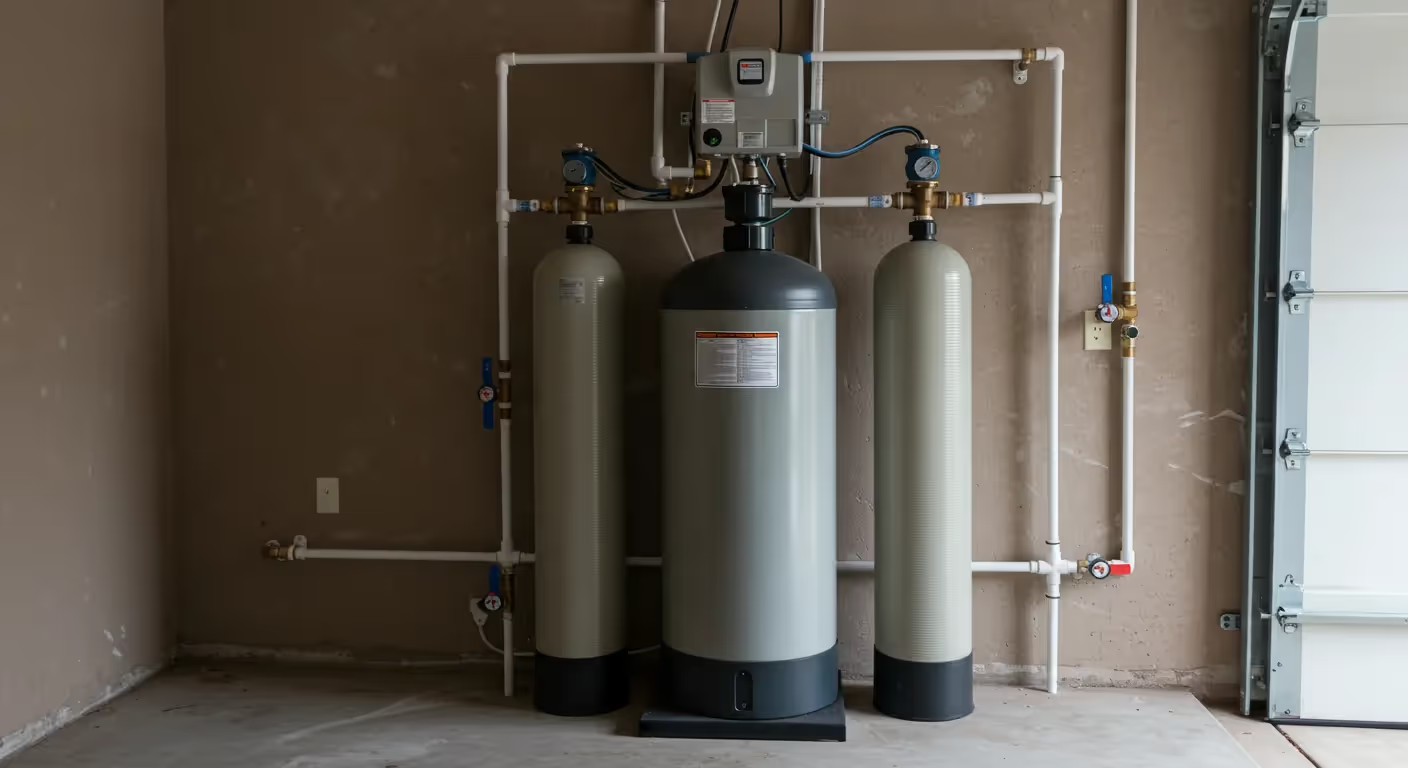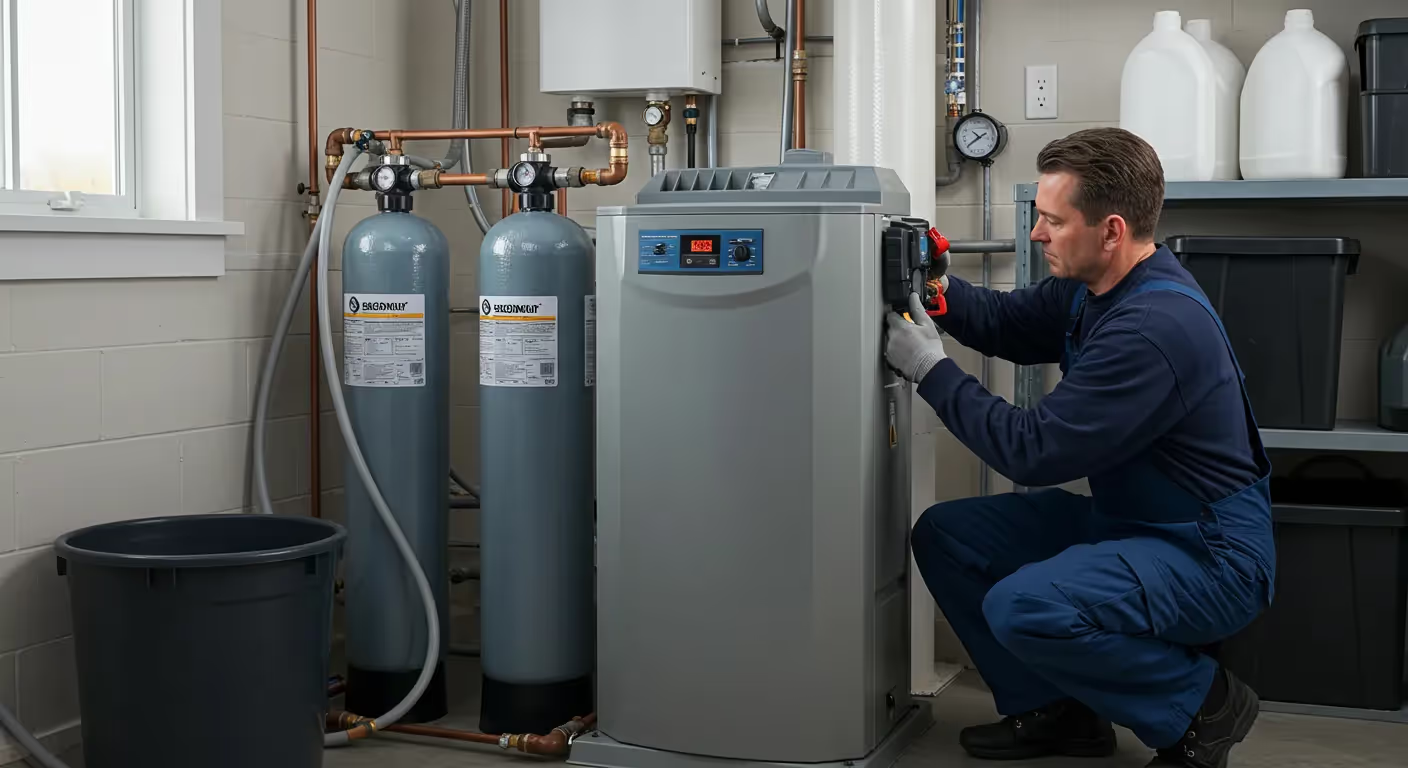Water Softening Systems in Castle Hills, TX
Many homeowners in Castle Hills, TX are familiar with the challenges posed by hard water. This common issue occurs when water contains high levels of dissolved minerals, primarily calcium and magnesium. While not harmful to drink, hard water can create numerous frustrations and even costly problems throughout your home's plumbing system and beyond. Understanding the signs of hard water and the benefits of effective solutions like water softening systems is the first step toward resolving these issues for good.
The water in the greater San Antonio area, including Castle Hills, is known for its significant hardness. This means that as water travels through the ground, it picks up a substantial amount of these minerals from the rock and soil. When this mineral-rich water enters your home, it leaves behind deposits that can affect everything it touches. Addressing hard water isn't just about convenience; it's about protecting your investments and ensuring the longevity of your home's plumbing and appliances.
Recognizing the Signs of Hard Water
Identifying hard water is often straightforward once you know what to look for. While a professional water test can confirm the exact hardness level, several common indicators can point to the presence of excessive minerals in your Castle Hills home's water supply.
Look out for these telltale signs:
- Soap Scum Buildup: This is one of the most visible signs. Hard water reacts with soap to form a sticky residue called soap scum, which is difficult to rinse away. You'll often find it clinging to shower walls, tubs, sinks, and even on your dishes.
- Mineral Spots (Water Spots): After washing dishes or cleaning surfaces, you might notice cloudy white spots or streaks left behind when the water dries. These spots are mineral deposits, primarily calcium, that have precipitated out of the hard water. This is particularly noticeable on glass, chrome fixtures, and dark surfaces.
- Dull Laundry: Clothes washed in hard water can feel stiff, look dull, and colors may fade more quickly. The minerals interfere with detergents, preventing them from working effectively and leaving mineral residue embedded in the fabric fibers. You might also find yourself needing to use more detergent to achieve clean results.
- Dry, Itchy Skin and Dull Hair: Minerals in hard water can leave a residue on your skin and hair, causing dryness, irritation, and making hair feel brittle or lifeless. Soap doesn't lather as well, and shampoo is harder to rinse out completely, contributing to these issues.
- Reduced Appliance Lifespan: Appliances that use water, such as washing machines, dishwashers, coffee makers, and especially Water Heaters and Tankless Water Heaters, can suffer significantly from hard water. Mineral deposits, known as scale, build up inside components, reducing efficiency and leading to premature breakdowns.
- Plumbing Problems: Scale buildup isn't limited to appliances. It can accumulate inside pipes, restricting water flow and potentially increasing water pressure, which puts a strain on the Plumbing Services system. This mineral buildup can also corrode pipes over time and contribute to problems in specific areas like Kitchen Plumbing and Bathroom Plumbing.
- Increased Energy Bills: When scale builds up inside water heaters or other water-using appliances, they have to work harder to heat water or perform their function. This inefficiency can lead to higher energy consumption and increased utility bills.
- Needing More Soap and Detergent: Because hard water doesn't allow soap to lather effectively, you'll typically need to use more soap, shampoo, laundry detergent, and dish soap to get things clean. This adds to your household expenses over time.
If you are experiencing one or more of these issues in your Castle Hills home, hard water is likely the culprit.

The Advantages of Soft Water
Installing a water softening system offers numerous benefits that directly address the problems caused by hard water. Switching to soft water can improve your daily life and protect your home's infrastructure.
The benefits include:
- Extended Appliance Lifespan: Soft water prevents the damaging buildup of mineral scale inside water-using appliances, helping them operate more efficiently and last longer. This protects significant investments like your washing machine, dishwasher, and Water Heaters.
- Improved Plumbing Health: With soft water flowing through your pipes, mineral scale buildup is eliminated or significantly reduced. This helps maintain optimal water flow, protects pipes from corrosion, and reduces the likelihood of plumbing issues requiring Slab Leak Repairs or Whole Home Repiping down the line due to scale damage.
- Easier Cleaning: Soap lathers freely in soft water, and soap scum and mineral spots are dramatically reduced. Cleaning tasks become much simpler and less time-consuming, leaving surfaces sparkling clean without the need for harsh chemical cleaners to remove stubborn residue.
- Softer Skin and Shinier Hair: Soft water allows soap to rinse completely away, leaving skin feeling softer and smoother. Hair is easier to manage, feels cleaner, and looks shinier and healthier.
- Brighter, Softer Laundry: Detergents perform better in soft water, leading to cleaner, brighter, and softer clothes. Colors remain vibrant for longer, and you won't have that stiff, dull feeling that hard water can leave on fabrics. You'll also likely need less detergent per load, saving money.
- Energy Savings: Water heaters and other appliances working with soft water operate more efficiently because they aren't fighting against insulating mineral scale. This can translate into noticeable savings on your energy bills.
- Reduced Soap and Detergent Costs: Because soap and detergents work more effectively in soft water, you can use significantly less product for cleaning, washing dishes, and doing laundry, leading to savings over time.
Switching to soft water provides tangible benefits that enhance comfort, reduce maintenance, and protect your home's plumbing and appliances in Castle Hills.
How Water Softening Systems Work
Most residential water softening systems operate on a principle called ion exchange. Hard water, containing positively charged calcium and magnesium ions, passes through a tank filled with resin beads. These resin beads are typically coated with positively charged sodium or potassium ions.
As the hard water flows over the beads, the calcium and magnesium ions, having a stronger positive charge, are attracted to the resin beads and swap places with the sodium or potassium ions. The calcium and magnesium stick to the beads, while the sodium or potassium ions are released into the water. This process effectively removes the hardness minerals from the water, replacing them with a trace amount of sodium or potassium, resulting in soft water.
Periodically, the resin beads become saturated with calcium and magnesium ions and need to be regenerated. This process involves flushing the resin tank with a brine solution (saltwater). The concentrated sodium ions in the brine displace the calcium and magnesium ions from the beads, which are then flushed away to a drain. The resin beads are then ready to capture hardness minerals again. This is why salt-based softeners require the addition of salt to a brine tank.
There are also "salt-free" Water Filtration systems, often referred to as water conditioners, that don't remove the minerals but instead alter their structure to prevent them from sticking to surfaces and forming scale. While these can offer some benefits, traditional ion exchange softeners are typically the most effective method for truly softening water and eliminating all hard water signs like soap scum and reduced lathering.
Choosing and Installing a Water Softening System
Selecting the right water softening system for your Castle Hills home depends on several factors, including your water's hardness level, the size of your household (which affects water usage), and your budget. Systems are rated by their capacity, measured in grains of hardness the system can remove before needing regeneration.
Determining your water hardness is a crucial first step. While San Antonio water is generally very hard, getting a specific test for your home provides the data needed to size a system correctly. A system that is too small will regenerate too frequently, using more salt and water, while an oversized system is an unnecessary expense.
Professional installation is highly recommended for water softening systems. The installation process involves connecting the unit to your main water line, typically near where the water enters your home, before it branches off to the Water Heaters and other fixtures. This ensures all the water used in your home is softened. Proper installation requires plumbing expertise to ensure correct connections, bypass valves, and drainage for the regeneration process. Attempting a DIY installation without the necessary skills can lead to leaks or system malfunctions.
Our team is experienced in working with the unique plumbing systems found in Castle Hills homes and understands the specifics of the local water supply. We can help you assess your needs, recommend the appropriately sized system, and handle the entire installation process efficiently and correctly.
Maintenance for Your Water Softener
Maintenance requirements vary depending on the type of water softening system you choose. For traditional salt-based softeners, the primary maintenance task is keeping the brine tank supplied with salt. The frequency of adding salt depends on your water hardness, household size, and the system's efficiency. It's important to use the correct type of salt recommended by the manufacturer.
Occasionally, you may need to clean the brine tank or address issues like salt bridging, where the salt forms a crust that prevents it from dissolving properly. Regular checks of the system's settings and overall performance are also advisable.
While some maintenance is simple, professional service can help ensure your system is running optimally. This might include checking resin levels, inspecting components, and verifying regeneration cycles. A well-maintained water softener will provide years of reliable service and consistent soft water throughout your Castle Hills home.
Your Local Water Softening Experts in Castle Hills
Addressing hard water in Castle Hills requires solutions tailored to the specific conditions of the area. Our team has extensive experience serving residents here, understanding the local water composition and the best approaches to tackle its hardness effectively.
We provide comprehensive Water Softeners Repair & Install services, from helping you select the ideal system for your home's needs to professional installation and ongoing support. We are committed to providing reliable service that brings the many benefits of soft water to your doorstep. Protecting your home's plumbing and appliances while improving your water quality is our priority.
We understand that investing in a water softening system is an important decision. We stand behind the quality of our work and the products we install. Our Worry-Free Warranty covers our labor and materials used on your plumbing projects, providing you with confidence in the reliability of our service and the long-term performance of your new water softener. Ask your technician for details on how our warranty applies to your water softening service.
Whether you're tired of soap scum and water spots or concerned about the impact of hard water on your home's infrastructure, we are here to provide effective and lasting solutions for water softening in Castle Hills, TX. We are ready to help you enjoy all the advantages that soft water brings to your home.
Start Enjoying Softer, Cleaner Water Today
Don't let hard water continue to cause problems for your home and family in Castle Hills, TX. With the right water softening system, you can eliminate mineral buildup, extend the life of your plumbing and appliances, and experience the comfort of softer skin, shinier hair, and cleaner laundry. Whether you're installing a new system or replacing an outdated one, our team is here to guide you every step of the way.
Contact us today to schedule your free water consultation and learn how our expert water softening solutions can transform your home.
Financing options
flexible financing solutions

We offer convenient financing options through Wells Fargo, making it easier to invest in plumbing or HVAC upgrades with flexible payments that fit your budget. Your comfort, safety, and satisfaction are always our top priorities—every service, every time.
Apply for Financing
We offer flexible financing options through GreenSky to help you move forward with essential plumbing or HVAC upgrades without delay. With quick approvals and affordable monthly payments, you can get the service you need while staying within budget.
Apply for Financing
We offer financing through Synchrony to make it easier to get the plumbing or HVAC service you need without delay. With simple application steps and convenient monthly payments, you can manage costs while enjoying reliable home comfort.
Apply for Financing
where we serve

.png)

.png)